100th Anniversary Great Nave Tour at the Cathedral of St. John the Divine
Celebrate the 1925 construction of the stunning nave inside the world's largest Gothic cathedral!


Earlier today, a historical groundbreaking ceremony marked the launch of the American Museum of Natural History’s latest expansion: the new Richard Gilder Center for Science, Education, and Innovation. The groundbreaking ceremony was hosted by Ellen V. Futter, President of the American Museum of Natural History, who spoke to the the growth of the museum and the broadening of its range of focus. Notable attendees included architect Jeanne Gang and elected officials such as New York City Mayor Bill de Blasio and Gale Brewer, Borough President of Manhattan.
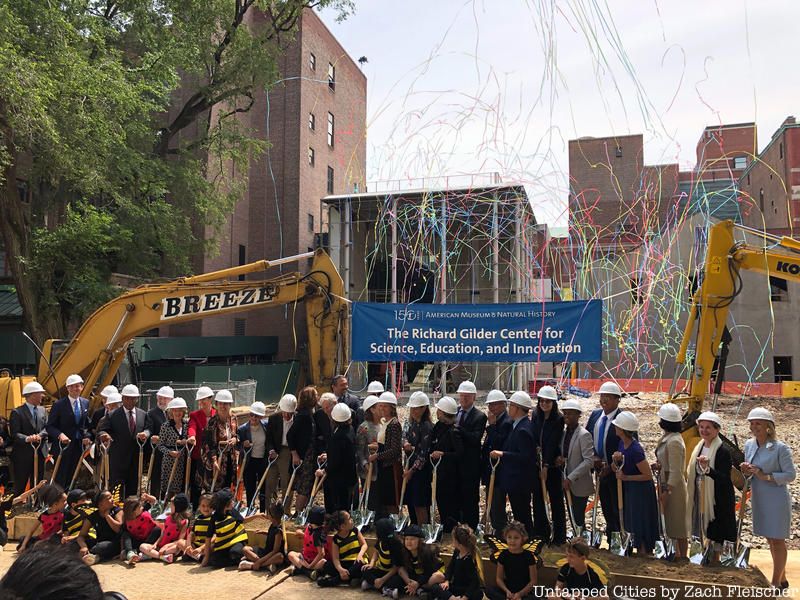
Designed by architect Jeanne Gang, founding principal of Studio Gang and one of Time Magazine’s 100 Most Influential people of 2019, the Richard Gilder Center will add 230,000 square-feet space to the museum. The $383 million project will be an environmentally sustainable extension that Gang hopes will draw people in, facilitate exploration and “spark curiosity about science and nature.” The design of the structure is intended to connect with the feel of the greater neighborhood and the museum’s existing status within it. Previous projects for Studio Gang include Nature Boardwalk at Lincoln Park, the Aqua Tower in Chicago and the Solomon Guggenheim Foundation Headquarters.
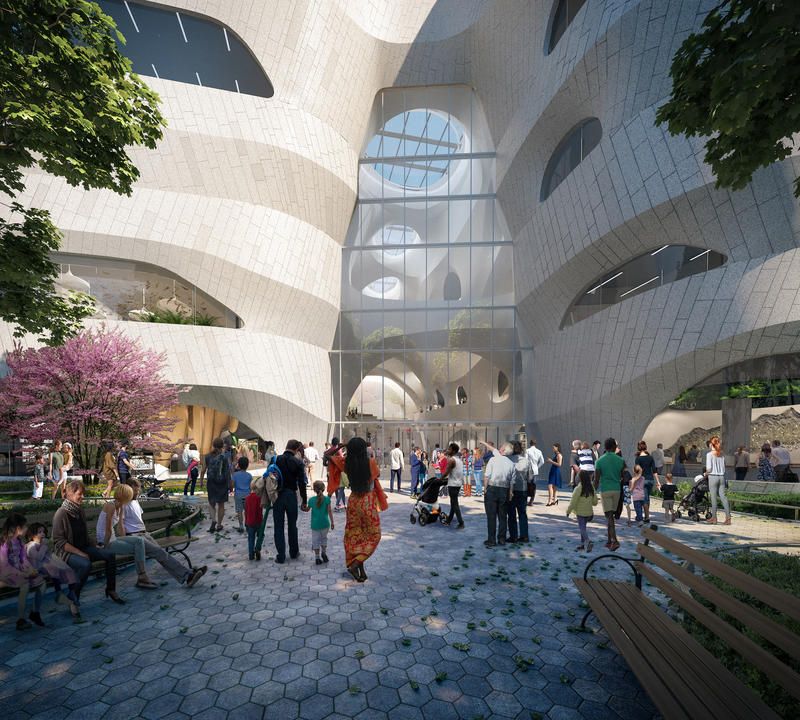 Entrance: A rendering of the entrance to the Gilder Center from Theodore Roosevelt Park. Rendering by Neoscape and Studio Gang, 2019
Entrance: A rendering of the entrance to the Gilder Center from Theodore Roosevelt Park. Rendering by Neoscape and Studio Gang, 2019
The building’s facade is inspired by natural earth processes and features a multi-story glass wall entrance, allowing natural light to illuminate nearly the entire space. The exhibit will also allow visitors to peer into active working collection areas in order to see first hand, the physical evidence that scientific findings are extrapolated from. Gang stated that “our design for the Gilder Center will invite visitors to explore the wonders of the museum with its openness and smooth, flowing geometry. Through a network of new connections, people will be able to follow their own curiosity to discover treasures of natural history. this network is accessed through the Central Exhibition Hall, which utilizes the fluidity of concrete to create a porous structure and iconic interior.”
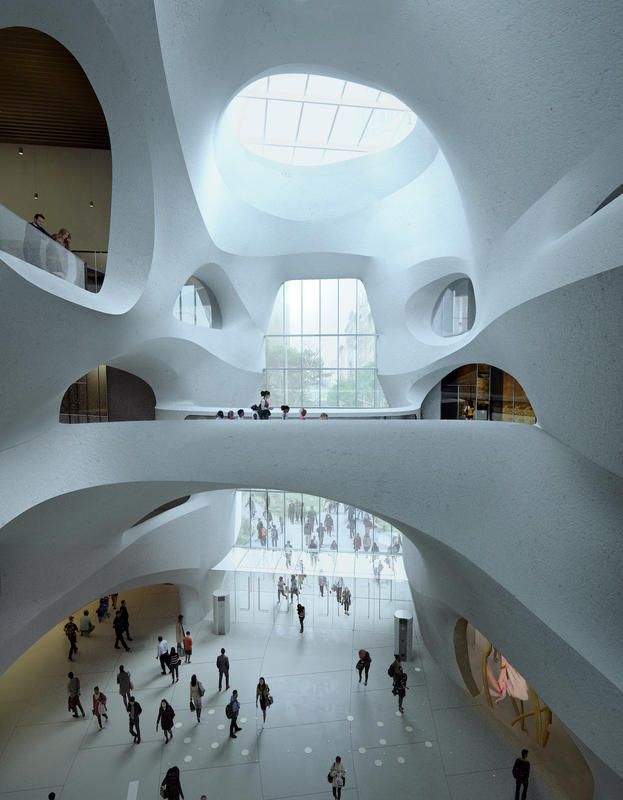 Interior: Designed by architect Jeanne Gang of Studio Gang, the Gilder Center features breathtaking architectural forms inspired by natural Earth processes, as shown in this rendering. Rendering by MIR and Studio Gang, 2019
Interior: Designed by architect Jeanne Gang of Studio Gang, the Gilder Center features breathtaking architectural forms inspired by natural Earth processes, as shown in this rendering. Rendering by MIR and Studio Gang, 2019
The Richard Gilder Center will house a number of new and significant additions to the expansive museum. Among the added components will be larger exhibition galleries, state-of-the-art classrooms, an immersive theater, and an expanded library. The Richard Gilder Center will also display a wider range of the museum’s famous and storied scientific exhibits and collections that visitors commonly travel far and wide to see. The space will additionally connect to approximately ten existing museum structures in order to ensure uncomplicated access from all entrances. The new pathways will open up foot traffic and add ease to visitor flow throughout the entire museum.
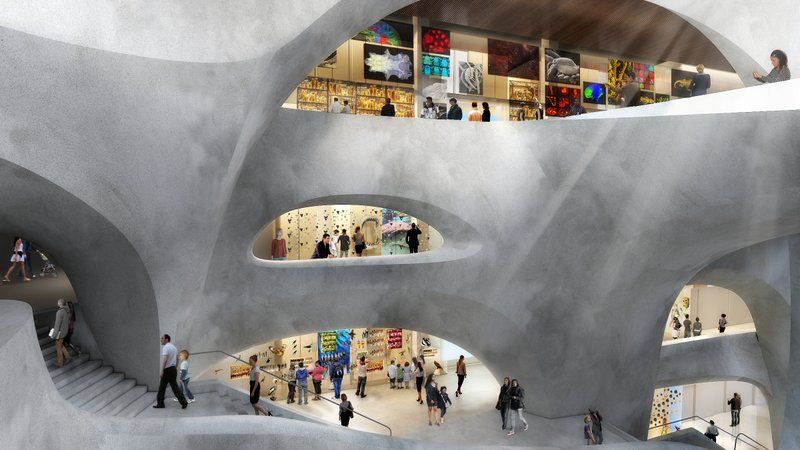
The 5-story high Collections Core. Image courtesy of Ralph Appelbaum Associates.
Mayor De Blasio expressed that “for 150 years, the American Museum of Natural History has reigned as one of the greatest and cultural and scientific institutions in the world… it has also become a place of joy and exploration for children around the world. The city’s investment into the Gilder Center project (nearly $78 million) will enable the museum to provide enrichment programs to more children and share more of its vast collection with the public.”
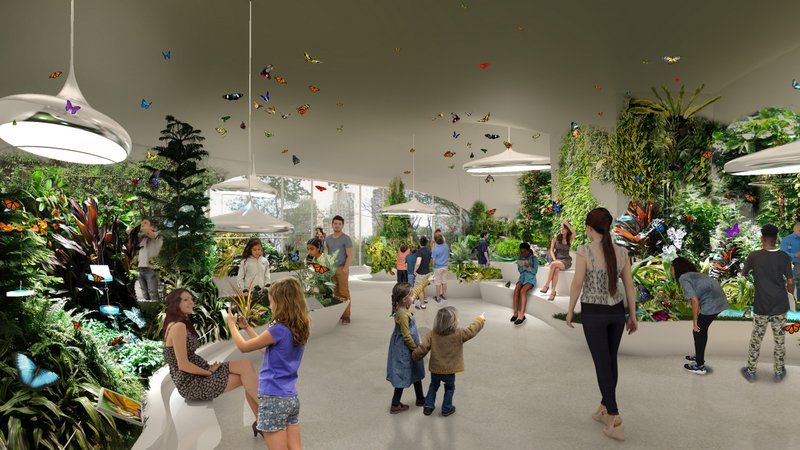
Butterfly Vivarium on the second floor of the Gilder Center. Image courtesy of Ralph Appelbaum Associates.
Unlike many existing exhibits within the museum, the Richard Gilder Center will have a specific focus on education in addition to the public displays the museum is traditionally known for. The museum cites the contemporary relevance of pressing scientific issues such as climate change for the urgent need to install an educationally-focused space to support informed and constructive interaction with such topics. This new section of the museum serves the purpose of fostering an environment for students, teachers, and families to engage with science and come away with a more holistic scientific view from their museum visit. Ellen Futter expressed that a modern exhibit “of our time and for our times” will increase science literacy, improve teacher preparedness and bolster the ability for the populous to participate thoughtfully in a democracy.
Next, check out the Top 12 Secrets of the American Museum of Natural History.
Subscribe to our newsletter